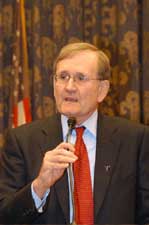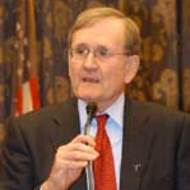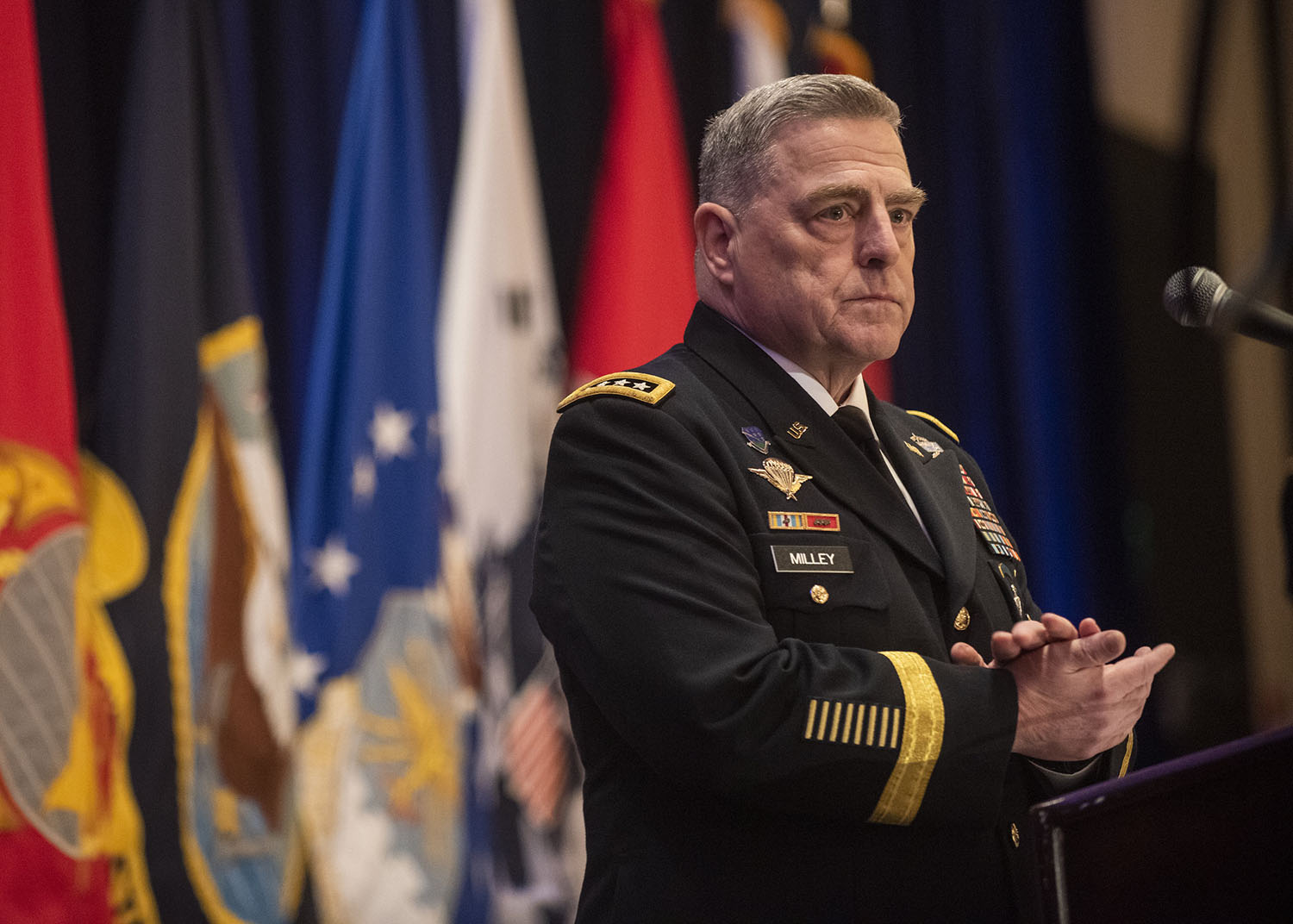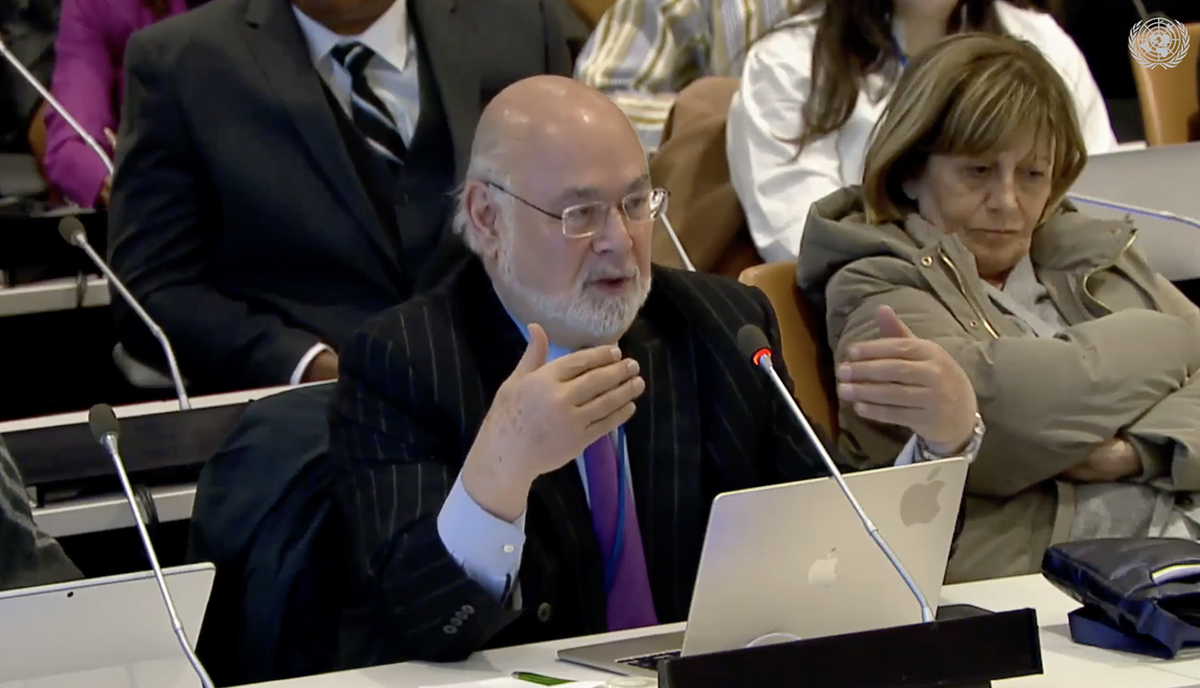Remarks by Ambassador Thomas Graham Jr.
Washington, DC
October 2, 2003
 Disarmament, arms control, is not a new issue. In the Middle Ages, the Pope outlawed the crossbow declaring it to be “hateful to God and unfit for Christians.” However, the crossbow was later overtaken in effectiveness by the English longbow. And both the crossbow and the longbow were then eclipsed by the destructive firepower of the cannon.
Disarmament, arms control, is not a new issue. In the Middle Ages, the Pope outlawed the crossbow declaring it to be “hateful to God and unfit for Christians.” However, the crossbow was later overtaken in effectiveness by the English longbow. And both the crossbow and the longbow were then eclipsed by the destructive firepower of the cannon.
But, everything changed in 1945 with the advent of the atomic bomb, for the first time humankind possessed a weapon with which it could destroy itself. Disarmament efforts gradually gained momentum and over time a web of international treaties and agreements was constructed which limited weapons development and inhibited the spread of nuclear weapons as well as chemical and biological weapons. And, there is no question but that these efforts changed the course of history.
But, nuclear weapons are truly a thing apart as everyone in this audience knows. The atomic bomb used against Hiroshima in 1945 was 14 kilotons or 14 thousand tons of TNT explosive equivalent. But in a few years, the United States and the Soviet Union were testing nuclear weapons in the megaton range or million tons of TNT explosive equivalent. Just by way of reference, one megaton is equivalent to a freight train loaded with TNT which stretches from New York to Los Angeles.
Soon, a vast nuclear arms race was underway, the Soviet Union built 45,000 nuclear weapons, the United States more than 30,000. This effort eventually bankrupted the Soviet Union and cost the United States in excess of $5.5 trillion. But, in the 1960s, it appeared as if these weapons would spread all over the world. In 1962, there were reports estimating that there would be 25-30 nuclear weapons states with nuclear weapons integrated into their national arsenals by the end of the 1970s. If this had happened, there would likely be more than 50 nuclear weapon states today. This would have created a nightmarish world, one in which every conflict would run the risk of going nuclear, it would be impossible to keep these weapons out of the hands of terrorists because they would be so widespread and the continued existence of our civilization would hang in the balance every day.
The principal reason that this did not happen was the negotiation of the Nuclear Non-proliferation Treaty, the NPT in 1968, its entry into force in 1970, and its permanent extension in 1995. It converted what had been an act of national pride (the acquisition of nuclear weapons) into an act of international outlawry. In exchange for the then five nuclear weapon states agreeing to certain nuclear arms control and disarmament commitments, the rest of the world agreed never to acquire nuclear weapons. But, we must not forget that the NPT did come at a price in arms control commitments for the nuclear weapon states (the United States, Russia, France, the UK and China), including ; for example, deep reductions in nuclear weapons leading to their elimination, a comprehensive nuclear test ban treaty, and a pledge never to use nuclear weapons against non-nuclear weapon NPT parties (now 182 nations – almost the whole world).
Recently, we paused to remember the terrible tragedy of September 11, 2001. But, as horrible as the attacks on the World Trade Center and the Pentagon were, they would have been orders of magnitude worse if a nuclear explosive device had been involved. And it is clear that today, the principal threat to our security is so-called “rogue states” and international terrorist organizations combined with the threat of nuclear proliferation. To this, the only long-term effective response is increased and intensive international cooperation and commitment to the rule of law.
However, in recent years, the United States has moved more to a unilateral world-wide confrontational strategy rather than one of cooperation. For over 50 years, the United States pursued a balance of power policy among the Great Powers, the United States, Russia, China, and Europe. The North Atlantic Treaty Organization and the U.S.-Japan Alliance are among the institutions and partnerships created by this grand strategy whose centerpiece was containment of the Soviet Union. At the same time, the United States pursued a world order built on rules and international treaties that permitted the expansion of democracy, the enlargement of international security, free market economies, and free trade. And within this international order, based on these twin policies, that we created, in addition to keeping the peace, we gave political cover to countries throughout the world to adopt the American position but doing so by joining international institutions and multi-lateral treaty regimes like the World Trade Organization and the NPT regime.
But, we have moved away from this world that we established. We have rejected new treaty arrangements important to key allies like the Kyoto Protocol and the International Criminal Court instead of attempting to amend them or leave them quietly “on the shelf.” And we have renounced treaty arrangements that are important to the world community such as the Anti-Ballistic Missile Treaty and a verification and inspection Annex to the Biological Weapons Convention.
In the past, the quest for security in a dangerous world, the effort to limit weapons and reduce the risk of war has always been a bi-partisan process. President Eisenhower negotiated the first arms control treaty in the modern age. President Kennedy concluded the Treaty prohibiting nuclear explosive tests in the atmosphere, and President Johnson signed the NPT. President Nixon began the Strategic Arms Limitation process; President Carter continued it and President Reagan continued it and converted it into the Strategic Arms Reduction process. President Clinton led the effort to make the NPT permanent and signed the test ban Treaty. President George H.W. Bush along with President Gorbachev, ended the Cold War with limited bloodshed which was not preordained. And, also on his watch, the first and second Strategic Arms Reduction Treaties were signed, along with the Conventional Armed Forces in Europe Treaty, the Treaty that ended the Cold War, and the Chemical Weapon Convention, prohibiting poison gas weapons. And, Senators Sam Nunn and Dick Lugar in their creation of the Nunn-Lugar program for Russia and many other activities over the years set the standard for bi-partisanship.
America does not need empire, it needs peace, cooperation, and the international rule of law. America should move away from the tendency toward unilateralism and should return to its historic destiny of keeping the peace and fostering the development of the community of nations, democracies, free market economy, the international rule of law, international institutions, and treaty arrangements. This is both consistent with our principles and our national interest. It is in this way that the twin threats of nuclear proliferation and international terrorism will be lifted. And, it is in this way that peace and stability for the 21st century will finally be attained.
Biography: Ambassador Thomas Graham, Jr. is internationally known as one of the leading authorities in the field of arms control agreements to combat the spread of nuclear, biological and chemical weapons. He has served as a senior U.S. diplomat involved in the negotiation of every major international arms control and non-proliferation agreement for the past 30 years, including The Strategic Arms Limitations Talks (SALT) Treaties, The Strategic Arms Reduction Talks (START) Treaties, The Anti-Ballistic Missile (ABM) Treaty, Intermediate Nuclear Force (INF) Treaty, Nuclear Non-Proliferation Treaty (NPT), Conventional Armed Forces in Europe (CFE) Treaty, and Comprehensive Test Ban Treaty (CTBT). Ambassador Graham is currently chair of the Bipartisan Security Group, a program of the Global Security Institute. His recent book Cornerstones of Security: Arms Control and International Law in a Nuclear Era is a landmark book on the subject.
“The Limits of Unilateralism” presentation at the U.S. Congress October 2, 2003 was hosted by the House of Representatives Bipartisan Task Force on Non-Proliferation in cooperation with the Bipartisan Security Group, a program of the Global Security Institute. For more information about the Task Force, please contact Ramsey Hoguet (Rep. Markey) at 202-225-2836 or Jordan Press (Rep. Shays) at 202-225-5541. For information about the Bipartisan Security Group, please contact Ambassador Robert Grey at 202-543-9017.







